Queensland quietly grants fracking leases to Origin in fragile channel country
Environment groups believe the energy giant is targeting shale oil, but the company says project in ‘early stages’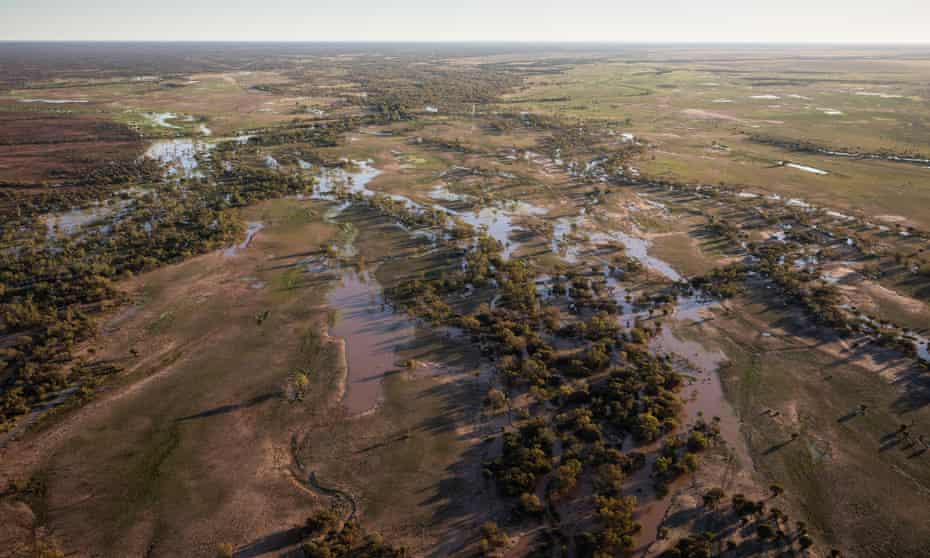
Environment groups believe the energy giant is targeting shale oil, but the company says project in ‘early stages’

Origin Energy will now need to gain environmental approvals before any fossil fuel exploration in Queensland’s channel country after it was granted fracking leases. Photograph: David Maurice Smith/Oculi
Graham Readfearn
@readfearn
Fri 17 Dec 2021 02.12 GMT
The Queensland government has quietly approved applications from energy company Origin that could lead to the extraction of fossil fuels across 225,000 hectares of Queensland’s channel country – part of one of the world’s last major free-flowing desert river systems.
Environmentalists and traditional owners said drilling in the fragile environment would threaten rivers, unique wildlife and could compromise the region’s organic beef industry. There are fears that the controversial technique known as hydraulic fracturing, or fracking, could also be used.
The Queensland government said Origin would now need to gain environmental approvals before it could begin any exploration works. The company said the project was in its “early days”.
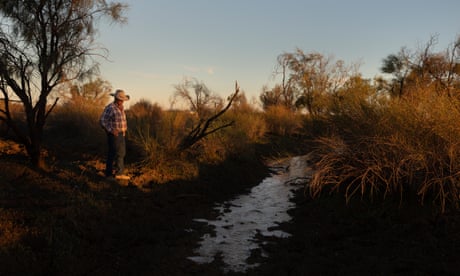
‘The living heart of Australia’: fracking plans threaten fragile channel country
The Guardian revealed in January Origin had submitted petroleum applications in 10 areas across the channel country – part of the vast Kati Thanda-Lake Eyre basin.
Angus Emmott, a channel country grazier and naturalist, said the granting of the leases was “totally unacceptable” and the state government had promised at the last three elections to protect the region.
“Now they’ve gone and done this. These are the last free-flowing desert rivers on the face of the earth and we need governments with the guts to protect them.”
Environment groups believe Origin is targeting shale oil from the region, but the company says until exploration starts it will not know what kind of fossil fuels are there.
Ellie Smith, of environment group Lock the Gate Alliance, said there had not been meaningful consultation with the community before the leases were granted.
She said: “Communities who rely on the free-flowing desert rivers of the region will suffer tremendously if Origin Energy now builds industrial-scale, polluting shale oilfields.
“Exploiting this unique and spectacular part of Queensland for shale oil will also release a carbon bomb at a time when the world desperately needs to rein in its addiction to fossil fuels to mitigate the climate crisis.”
Riley Rocco, a spokesperson for the Western Rivers Alliance, a group of conservationists, graziers and traditional owners, said they were “deeply concerned” and feared Origin would use controversial hydraulic fracturing techniques.
Rocco said the government had committed to consulting with traditional owners and stakeholders “to ensure this world renowned river and wetland system is protected”.
“The Lake Eyre basin rivers and wetlands are rich in wildlife and cultural heritage,” Rocco said. “The channel country’s profitable organic beef industry relies on the floodplains being naturally irrigated from unhindered clean water flows. To allow new oil and gas mining here is to put the local community and wildlife at risk.”
Traditional owners are worried about the potential impact of drilling, pipelines and infrastructure on waterways and that this could also interfere with traditional songlines that are based on the routes of the rivers.
Karen Monaghan, a Wangkangurru Yarluyandi traditional owner and member of Lake Eyre Basin Traditional Owners Alliance, said: “The channel country is my mother’s Country.
“I grew up swimming in these rivers and I don’t want them fracked for oil or gas, dried out or dammed.”
A statement from Origin Energy said no work had been carried out on any of the petroleum leases.
“It’s very early days with regards to any proposed exploration activity in these permit areas,” a spokesperson said.
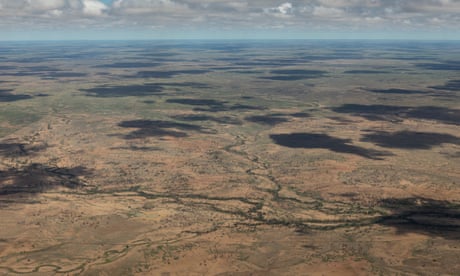
A dream of belonging: for Indigenous Australians, the fabled ‘outback’ is home
“The nature of exploration is to firstly determine what resources are in that particular area and whether they are recoverable.
“As is the case with all our operations, we would put in place approved management plans, procedures and controls to protect the environment and waterways, as well as areas of cultural significance.”
A statement from the Queensland Department of Resources said: “Any resources project must stack up environmentally, socially and financially and are assessed against strict criteria.”
Origin Energy must be granted an environmental authority before it could carry out exploration works, the statement said.
The department said traditional owners that held a native title claim were notified and consented prior to the approval of the petroleum leases.
An independent report commissioned in 2019 by the Queensland government, but not made public until last year, called for a ban on unconventional gas exploration in the region.
The report, which was leaked and later tabled in parliament, recommended gas wells and ponds be excluded from areas which frequently flood, and unconventional petroleum and gas production should be designated “unacceptable use” in an area that overlaps with some of the Origin lease applications.
The Guardian has approached the state’s environment department for comment.
Graham Readfearn
@readfearn
Fri 17 Dec 2021 02.12 GMT
The Queensland government has quietly approved applications from energy company Origin that could lead to the extraction of fossil fuels across 225,000 hectares of Queensland’s channel country – part of one of the world’s last major free-flowing desert river systems.
Environmentalists and traditional owners said drilling in the fragile environment would threaten rivers, unique wildlife and could compromise the region’s organic beef industry. There are fears that the controversial technique known as hydraulic fracturing, or fracking, could also be used.
The Queensland government said Origin would now need to gain environmental approvals before it could begin any exploration works. The company said the project was in its “early days”.

‘The living heart of Australia’: fracking plans threaten fragile channel country
The Guardian revealed in January Origin had submitted petroleum applications in 10 areas across the channel country – part of the vast Kati Thanda-Lake Eyre basin.
Angus Emmott, a channel country grazier and naturalist, said the granting of the leases was “totally unacceptable” and the state government had promised at the last three elections to protect the region.
“Now they’ve gone and done this. These are the last free-flowing desert rivers on the face of the earth and we need governments with the guts to protect them.”
Environment groups believe Origin is targeting shale oil from the region, but the company says until exploration starts it will not know what kind of fossil fuels are there.
Ellie Smith, of environment group Lock the Gate Alliance, said there had not been meaningful consultation with the community before the leases were granted.
She said: “Communities who rely on the free-flowing desert rivers of the region will suffer tremendously if Origin Energy now builds industrial-scale, polluting shale oilfields.
“Exploiting this unique and spectacular part of Queensland for shale oil will also release a carbon bomb at a time when the world desperately needs to rein in its addiction to fossil fuels to mitigate the climate crisis.”
Riley Rocco, a spokesperson for the Western Rivers Alliance, a group of conservationists, graziers and traditional owners, said they were “deeply concerned” and feared Origin would use controversial hydraulic fracturing techniques.
Rocco said the government had committed to consulting with traditional owners and stakeholders “to ensure this world renowned river and wetland system is protected”.
“The Lake Eyre basin rivers and wetlands are rich in wildlife and cultural heritage,” Rocco said. “The channel country’s profitable organic beef industry relies on the floodplains being naturally irrigated from unhindered clean water flows. To allow new oil and gas mining here is to put the local community and wildlife at risk.”
Traditional owners are worried about the potential impact of drilling, pipelines and infrastructure on waterways and that this could also interfere with traditional songlines that are based on the routes of the rivers.
Karen Monaghan, a Wangkangurru Yarluyandi traditional owner and member of Lake Eyre Basin Traditional Owners Alliance, said: “The channel country is my mother’s Country.
“I grew up swimming in these rivers and I don’t want them fracked for oil or gas, dried out or dammed.”
A statement from Origin Energy said no work had been carried out on any of the petroleum leases.
“It’s very early days with regards to any proposed exploration activity in these permit areas,” a spokesperson said.

A dream of belonging: for Indigenous Australians, the fabled ‘outback’ is home
“The nature of exploration is to firstly determine what resources are in that particular area and whether they are recoverable.
“As is the case with all our operations, we would put in place approved management plans, procedures and controls to protect the environment and waterways, as well as areas of cultural significance.”
A statement from the Queensland Department of Resources said: “Any resources project must stack up environmentally, socially and financially and are assessed against strict criteria.”
Origin Energy must be granted an environmental authority before it could carry out exploration works, the statement said.
The department said traditional owners that held a native title claim were notified and consented prior to the approval of the petroleum leases.
An independent report commissioned in 2019 by the Queensland government, but not made public until last year, called for a ban on unconventional gas exploration in the region.
The report, which was leaked and later tabled in parliament, recommended gas wells and ponds be excluded from areas which frequently flood, and unconventional petroleum and gas production should be designated “unacceptable use” in an area that overlaps with some of the Origin lease applications.
The Guardian has approached the state’s environment department for comment.
Queensland Government grants oil and gas leases in Channel Country, failing to consult traditional owners
ABC Western Qld /
By Ellie Grounds and Nathan Morris
Posted Thu 16 Dec 2021
The Queensland Government was advised in 2019 by environmental scientists that fracking in the Channel Country was "unacceptable".(ABC News: Brendan Esposito)
The Queensland Government has quietly paved the way for fracking in the environmentally sensitive Channel Country, despite repeated promises to protect the area and an unfulfilled commitment to consult with traditional owners.
Key points:
The Queensland Government has quietly granted leases to Origin Energy to develop oil and gas over the Channel Country
The move comes after an election promise to protect the region and consult with traditional owners, some of whom say they feel 'dudded'
Controversial gas 'fracking' could now happen for the first time in the sensitive inland waterway
\
In October, 11 applications for petroleum leases across more than 250,000 hectares of land in the Channel Country bioregion of the Lake Eyre Basin were granted to gas company Origin Energy.
The Queensland Department of Resources said it received consent from the registered native title claim group, however, there is currently no native title claim over the land concerned.
An alliance group of traditional owner groups, which the government promised to consult, was also not consulted prior to the leases being approved.
The leases give Origin Energy the right to explore for and produce petroleum, and test for petroleum production. Though, the company still needs an Environmental Authority before commencing any resource development.
The granting of the petroleum leases means unconventional gas production could occur in the Channel Country for the first time which, in the shale geology of the Lake Eyre Basin, will likely require fracking.
The Lake Eyre Basin is one of the last remaining free-flowing river systems in the world.(ABC News: Brendan Esposito)
The Lake Eyre Basin is one of the last remaining free-flowing river systems in the world, where spectacular webs of waterways spread over 120 million hectares, across four states and territories.
The floodplains in the Channel Country support a thriving organic beef industry and carry enormous environmental importance as a wildlife habitat.
"It's of international significance," grazier Angus Emmott said, who lives on a property south-west of Longreach, at the top end of the Channel Country floodplains.
"We've got the Cooper [Creek], the Georgina and the Diamantina rivers, which are the last major desert rivers on the face of the planet that are not seriously compromised by human actions."
Angus Emmott and his family have been running cattle on Noonbah Station near Longreach for more than 100 years.(ABC Southern Queensland: Nathan Morris)
'There hasn't been any consultation'
Since the end of 2019, Labor has repeatedly committed to establishing a stakeholder advisory group and consulting traditional owners on achieving a balance between the region's economic prosperity and ecological sustainability.
The government helped establish the Lake Eyre Basin Traditional Owners Alliance, made up of more than a dozen local traditional owner groups, which former Environment Minister Leeanne Enoch promised to consult.
"We are going to work in partnership with First Nations peoples and support their establishment of the Lake Eyre Basin Traditional Owner Alliance, which will have an active role in the decision-making and management of that area," Ms Enoch said in a media release in December 2019.
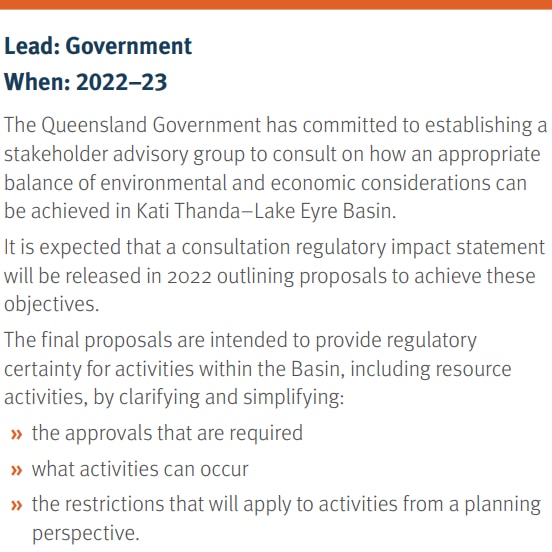
Since the end of 2019, Labor has repeatedly committed to establishing a stakeholder advisory group and consulting traditional owners on achieving a balance between the region's economic prosperity and ecological sustainability.
The government helped establish the Lake Eyre Basin Traditional Owners Alliance, made up of more than a dozen local traditional owner groups, which former Environment Minister Leeanne Enoch promised to consult.
"We are going to work in partnership with First Nations peoples and support their establishment of the Lake Eyre Basin Traditional Owner Alliance, which will have an active role in the decision-making and management of that area," Ms Enoch said in a media release in December 2019.
An excerpt from the Queensland Resources Industry Development Plan published in November 2021.(Supplied: Department of Resources)
Mithaka man George Gorringe is a traditional landowner in the area and is a founding member of the Alliance.
At the group's first meeting, which happened on Tuesday, December 14, Mr Gorringe said there was no mention of the petroleum leases being granted.
He only found out later that day.
"I got a phone call to say that this is what happened, and that is the first I'd heard about it," Mr Gorringe said.
"It was very disappointing to hear this, and also that there hasn't been any consultation."
The department said, "the registered native title claim group was notified and consented to the grant of the petroleum leases prior to the approval of the petroleum leases."
Origin Energy also said it had "been in contact with native title groups about meeting for some time and have participated in an introductory meeting with one group in recent weeks."
The National Native Title Tribunal shows there is currently no registered native title claim over the 11 Origin Energy petroleum leases.
Mithaka man George Gorringe is a traditional landowner in the area and is a founding member of the Alliance.
At the group's first meeting, which happened on Tuesday, December 14, Mr Gorringe said there was no mention of the petroleum leases being granted.
He only found out later that day.
"I got a phone call to say that this is what happened, and that is the first I'd heard about it," Mr Gorringe said.
"It was very disappointing to hear this, and also that there hasn't been any consultation."
The department said, "the registered native title claim group was notified and consented to the grant of the petroleum leases prior to the approval of the petroleum leases."
Origin Energy also said it had "been in contact with native title groups about meeting for some time and have participated in an introductory meeting with one group in recent weeks."
The National Native Title Tribunal shows there is currently no registered native title claim over the 11 Origin Energy petroleum leases.
The 11 petroleum leases (in purple) fall on land parcels that do not have a native title claim over them.(Supplied: Native Title Vision)
The area concerned falls between a Native Title claim by the Mithaka people to the west, and one by the Boonthamurra people to the east.
Mr Gorringe said neither the Mithaka people nor the Alliance was consulted prior to the petroleum leases being granted, which represents the Mithaka and Boonthamurra people among others.
"My feeling is, and it's pretty raw at the moment, that we've been sort of dudded," he said.
"Is it worthwhile to have this [stakeholder advisory] committee?
"I just wonder why that's even there?"
The area concerned falls between a Native Title claim by the Mithaka people to the west, and one by the Boonthamurra people to the east.
Mr Gorringe said neither the Mithaka people nor the Alliance was consulted prior to the petroleum leases being granted, which represents the Mithaka and Boonthamurra people among others.
"My feeling is, and it's pretty raw at the moment, that we've been sort of dudded," he said.
"Is it worthwhile to have this [stakeholder advisory] committee?
"I just wonder why that's even there?"
Grazier Angus Emmott, said holding meetings after the fact showed that the government was not genuine in its past commitment to protect the Channel Country and consult the community.
"We now have a government that is setting up this new sham consultation process to try and rubber stamp an outcome that they've pre-determined with the fossil fuel industry," Mr Emmott said.
"It's just pure political opportunism led by money, power and greed.
"I think it stinks."
Fracking in Channel Country 'unacceptable'
In September 2019 the Department of Environment and Science commissioned an independent scientific report into the potential impacts of oil and gas development, and other activities such as agriculture and tourism, on Queensland's Channel Country.
It found oil and gas development could "create barriers" on natural watercourses and drawdown water in the Great Artesian Basin.
In a 2019 report on the Channel Country, a scientific expert panel recommended unconventional gas production be deemed unacceptable.(Supplied: Queensland Government)
The scientists also said drilling and fracturing fluids could potentially pollute soil and water.
The report recommended that "unconventional petroleum and gas production be an unacceptable use" in the area and that "gas wells and ponds" be excluded from frequently flooded areas.
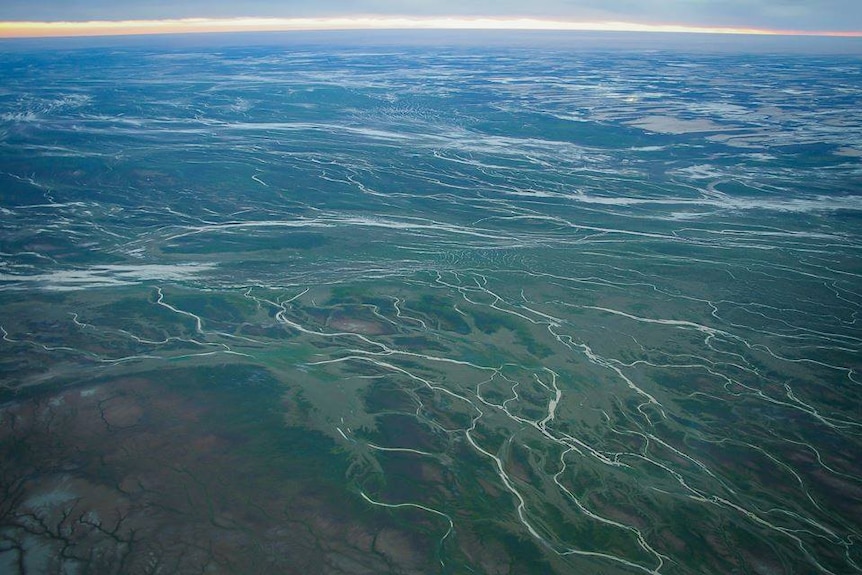
The scientists also said drilling and fracturing fluids could potentially pollute soil and water.
The report recommended that "unconventional petroleum and gas production be an unacceptable use" in the area and that "gas wells and ponds" be excluded from frequently flooded areas.
The Channel Country's floodplains support a thriving organic beef industry.
(Supplied: Angus Emmott)
Ellie Smith from environmental group Lock The Gate said the government's decision to grant the petroleum leases went against both scientific advice and election promises.
"What we've had over many election cycles is commitments from Labor governments to have some kind of adequate protection for the Lake Eyre Basin rivers and watercourses and balance that with the economic development in the region," Ms Smith said.
"We thought that the government would at least wait until the consultation had taken place before progressing any of those leases.
"I think the trust of the group is broken."
Ellie Smith from environmental group Lock The Gate said the government's decision to grant the petroleum leases went against both scientific advice and election promises.
"What we've had over many election cycles is commitments from Labor governments to have some kind of adequate protection for the Lake Eyre Basin rivers and watercourses and balance that with the economic development in the region," Ms Smith said.
"We thought that the government would at least wait until the consultation had taken place before progressing any of those leases.
"I think the trust of the group is broken."
Government still committed
In a statement to the ABC, the Department of Environment and Science said, "We are committed to protecting the rivers, watercourses and floodplains of the river systems in the Queensland section of the Lake Eyre Basin."
A spokesperson for the Department of Resources added that "any resources project must stack up environmentally, socially and financially and are assessed against strict criteria."
Angus Emmott's dog Banjo cools off in a flooded channel on their property.
(Supplied: Angus Emmott)
No comments:
Post a Comment